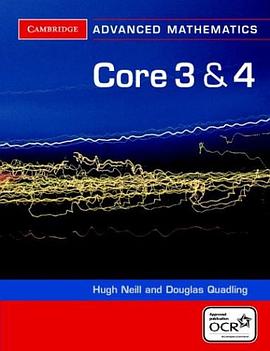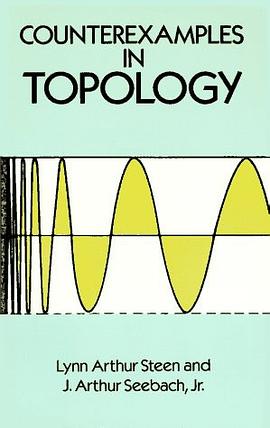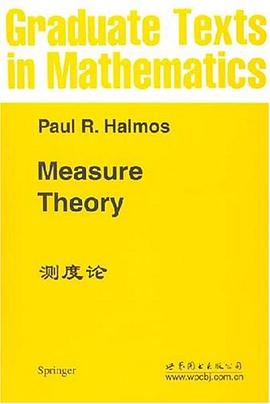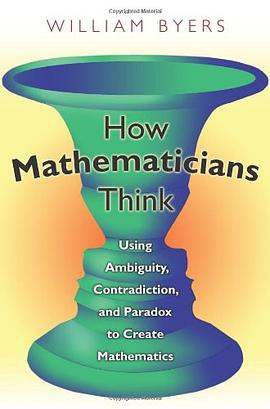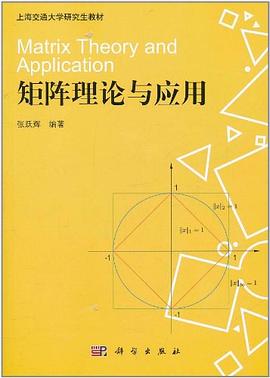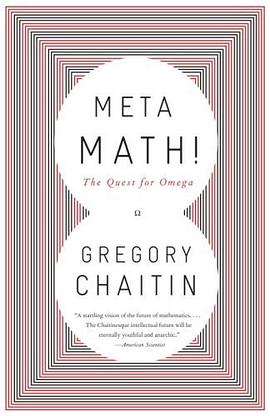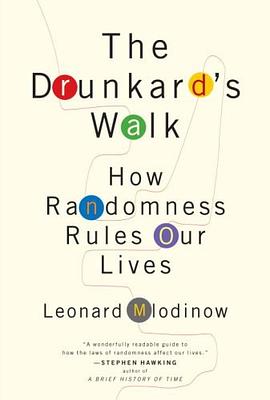

具体描述
In this irreverent and illuminating book, acclaimed writer and scientist Leonard Mlodinow shows us how randomness, change, and probability reveal a tremendous amount about our daily lives, and how we misunderstand the significance of everything from a casual conversation to a major financial setback. As a result, successes and failures in life are often attributed to clear and obvious cases, when in actuality they are more profoundly influenced by chance.
The rise and fall of your favorite movie star of the most reviled CEO--in fact, of all our destinies--reflects as much as planning and innate abilities. Even the legendary Roger Maris, who beat Babe Ruth's single-season home run record, was in all likelihood not great but just lucky. And it might be shocking to realize that you are twice as likely to be killed in a car accident on your way to buying a lottery ticket than you are to win the lottery.
How could it have happened that a wine was given five out of five stars, the highest rating, in one journal and in another it was called the worst wine of the decade? Mlodinow vividly demonstrates how wine ratings, school grades, political polls, and many other things in daily life are less reliable than we believe. By showing us the true nature of change and revealing the psychological illusions that cause us to misjudge the world around us, Mlodinow gives fresh insight into what is really meaningful and how we can make decisions based on a deeper truth. From the classroom to the courtroom, from financial markets to supermarkets, from the doctor's office to the Oval Office, Mlodinow's insights will intrigue, awe, and inspire.
Offering readers not only a tour of randomness, chance, and probability but also a new way of looking at the world, this original, unexpected journey reminds us that much in our lives is about as predictable as the steps of a stumbling man fresh from a night at the bar.
作者简介
Leonard Mlodinow was born in Chicago, Illinois, received his PhD in theoretical physics from the University of California at Berkeley, and is the author of five best-sellers. His book The Drunkard's Walk: How Randomness Rules our Lives was a New York Times Bestseller, Editor's Choice, and Notable Book of the Year, and was short-listed for the Royal Society book award. His book Subliminal won the PEN/Wilson award for literary science writing. His other books include two co-authored with physicist Stephen Hawking -- A Briefer History of Time, and The Grand Design. In addition to his books and research articles, he has taught at Caltech, written for the Wall Street Journal, the New York Times, and Forbes magazine, among other publications, and for television series such as McGyver and Star Trek: the Next Generation. www.leonardmlodinow.com
目录信息
读后感
“心理学发现,就成功而言,面对困难毫不退缩的品质,至少与天分同等重要。” 十年规则:多数事情,要取得相当成功,至少需要十年的刻苦,实践和奋斗。勤奋、机遇、天分同等重要。 IBM 先驱,Thomas Watson:要想成功,就把你的失败速度加倍。 能力与成功直接并非等号,偶然性...
评分读书笔记 - 文字摘录地址:http://book.douban.com/annotation/19550698/ 芝诺悖论 古希腊数学家芝诺(Zeno of Elea)提出的一系列关于运动的不可分性的哲学悖论。这些悖论由于被记录在亚里士多德的《物理学》一书中而为后人所知。芝诺提出这些悖论是为了支持他老师巴门尼德...
评分 评分 评分“心理学发现,就成功而言,面对困难毫不退缩的品质,至少与天分同等重要。” 十年规则:多数事情,要取得相当成功,至少需要十年的刻苦,实践和奋斗。勤奋、机遇、天分同等重要。 IBM 先驱,Thomas Watson:要想成功,就把你的失败速度加倍。 能力与成功直接并非等号,偶然性...
用户评价
“The Drunkard's Walk”——一个充满画面感的书名,让我想象着一个在夜色中,时而摇摆,时而停顿,却又从未真正停止前进的形象。这位“醉汉”的步伐,在我看来,是一种对生命中“随机性”的生动隐喻。他可能并没有明确的目的地,但每一步的偏差,都可能导向一个全新的方向。这本书是否是在探索,我们如何在充满变数的世界里,做出看似微小但影响深远的决策?它是否会揭示,那些我们认为的“失误”或“运气”,在概率的宏大叙事中,扮演着怎样的角色?我尤其想知道,作者是如何用文字捕捉这种“漫步”的精髓,如何让我们理解那些看似杂乱无章的事件背后,可能存在的统计学规律。这种对“不确定性”的深入解析,让我感到既兴奋又警醒。我期待它能让我对自己的选择和所处的环境,有更深刻的认识。
评分读这本书之前,我一直认为生活中的许多事情都是可以预测和控制的,只要我们足够努力,足够聪明,就能掌握自己的命运。然而,"The Drunkard's Walk"这个书名却悄悄地在我心里种下了一颗怀疑的种子。它让我思考,是不是我们所谓的“努力”和“聪明”在很多时候,也只是这位“醉汉”的随机摇摆所带来的表象?那些成功人士的轨迹,是否也充满了偶然的因素?而那些跌入谷底的人,是否也仅仅是因为在关键时刻,那位“醉汉”选择了错误的方向?这本书仿佛在提醒我,在这个充满不确定性的世界里,我们更需要的是一种理解和接受,而非一味的抗拒或控制。它或许会教导我们如何在这种“醉汉的漫步”中找到平衡,如何在看似随机的事件中发现意义,如何在混沌中保持清醒。我非常期待书中能够探讨那些我们无法预料的“黑天鹅”事件,以及它们如何深刻地影响着我们的生活和整个社会的发展。它可能会挑战我固有的认知,迫使我重新审视那些我曾经坚信不疑的真理。这种颠覆性的思考,往往是成长最有效的催化剂,我已准备好迎接这种智识上的洗礼。
评分这个书名,“The Drunkard's Walk”,带着一种无法言喻的吸引力。它不仅仅是一个描述,更像是一种哲学。那位“醉汉”,他的每一步都充满了不确定性,他可能在向前迈进,也可能在原地徘徊,甚至偶尔会向后退一步。然而,正是这种不可预测性,构成了他独特的“行走方式”。我期待这本书能够深入探讨,在科学、经济、社会以及我们个人的生活中,这种“醉汉的步伐”是如何普遍存在的。它是否会解释,那些看似随机的市场波动,那些意外的科学发现,或者那些改变历史进程的偶然事件,都可以用这种“漫步”的模式来理解?我非常好奇,作者会如何通过生动的例子和深入的分析,来揭示隐藏在混乱表象下的规律。这种对“不确定性”的拥抱和理解,对我来说,是一种极具价值的学习。
评分“The Drunkard's Walk”——仅仅是这个书名,就足以勾起我内心深处对于“命运”与“自由意志”之间关系的无限遐想。那位“醉汉”的步伐,是受酒精的驱使,还是潜意识里对某个方向的向往?他的每一步,是完全随机的,还是受到某些看不见的“力量”在引导?这本书会不会就像那个醉汉一样,带我进入一个充满未知转折的世界,在那里,理性的规划与偶然的际遇交织,模糊了成功的界限?我尤其感兴趣的是,作者将如何描绘那些看似微不足道的“小步”,如何累积起来,最终导致了截然不同的人生轨迹。这其中是否蕴含着某种深刻的数学原理,或者是对心理学奥秘的揭示?我想象着,在阅读的过程中,我会被邀请去观察那些我们平时忽略的细节,去理解那些看似失控的局面背后,可能存在的某种秩序。这种对“失序”中秩序的探索,无疑是极具挑战性,也极具吸引力的。
评分这本书的书名着实让人好奇,"The Drunkard's Walk",一个醉汉的漫步。初次见到这个名字,我脑海中浮现的画面是一个踉踉跄跄、看似毫无目的地在街头游荡的人,他每一步都充满了不确定性,却又带着一种奇妙的韵律。这种“随机性”和“必然性”的交织,在现实生活中随处可见,从股价的波动到天气预报的变幻,再到我们个人的生活轨迹,似乎都笼罩在这位“醉汉”的步伐之下。我期待这本书能为我揭示隐藏在看似混乱背后的规律,或者至少,提供一个全新的视角来理解我们身边的世界。是否这是一种对概率论的诗意解读?抑或是对人类行为模式的深刻洞察?书中是否会像这位醉汉一样,在看似随意跳跃的同时,又遵循着某种我们尚未察觉的内在逻辑?这名字本身就引发了无数的联想,让我对即将翻开的扉页充满了期待,渴望在文字的世界里,找到那位“醉汉”的身影,并跟随他的脚步,去探索那些我们习以为常却又未曾真正理解的现象。我尤其好奇,作者是如何将这样一个充满生活气息又带有一丝哲学意味的意象,融入到一本书的主题中的。这不仅仅是一个书名,更像是一把钥匙,开启了我对未知探索的渴望。
评分我之所以对“The Drunkard's Walk”这个书名产生浓厚的兴趣,是因为它本身就蕴含着一种矛盾而迷人的张力。那位“醉汉”,他的步伐看似混乱无章,但在这种混乱中,是否又隐藏着某种我们尚未察觉的秩序?他可能在朝着一个目标前进,但他的前进方式却充满了迂回和曲折。这本书是否在告诉我们,在这个世界上,很多事情并非如我们想象的那样直线发展?它是否会揭示,那些看似偶然的成功,背后可能隐藏着对“概率”的深刻理解?我特别期待书中能够探讨那些我们无法控制的外部因素,以及它们如何影响着我们的人生选择和最终的结局。这种对“不可控”的深入解析,让我觉得这本书具有非凡的现实意义。
评分初见“The Drunkard's Walk”这个名字,我脑海中立刻勾勒出了一幅画面:一个在夜晚的街头,摇摇晃晃,每一步都带着未知方向的旅人。他或许正从一家灯火通明的酒馆走出,带着微醺的惬意,也或许是被生活的压力所压垮,步履沉重。但无论如何,他的步伐都不是直线,而是充满了曲折和回旋。这种“不走寻常路”的意象,让我对书中即将展开的内容充满了好奇。它是否是在探讨那些不遵循常规路径,却最终抵达了非凡目的地的人生?抑或是揭示了那些看似随心所欲的选择,背后隐藏的深刻逻辑?我很想知道,作者是如何将“醉汉的漫步”这种充满不确定性的行为,与更宏大的主题联系起来的。这或许是对概率论在现实世界中应用的有趣阐释,又或者是对人类决策过程的细致剖析。我期待书中能够提供一些引人入胜的案例,那些看似偶然的成功或失败,在作者的笔下,是否会呈现出全然不同的解读?这种对“偶然”的深入挖掘,是这本书最吸引我的地方。
评分“The Drunkard's Walk”——这个书名立刻在我的脑海中勾勒出了一个模糊却又生动的意象:一个在夜晚街头,踉踉跄跄、步伐不稳的行人。他的每一步都充满了未知,仿佛每一次选择都可能将他引向截然不同的方向。这本书是否是在探讨,我们的人生轨迹,在多大程度上是由随机的因素所决定的?它是否会挑战我们对“命运”的传统看法,揭示那些我们认为的“必然”之中,隐藏着多少“偶然”的影子?我期待书中能够提供一些引人入胜的论据和案例,来支持作者的观点,让我们看到,即使是那些看似最随机的事件,也可能遵循着某种潜在的数学或统计规律。这种对“不确定性”的科学解读,对我来说,是一种极大的智力挑战,也是一种全新的认知方式。
评分当“The Drunkard's Walk”这个书名映入眼帘时,我立刻被它那略带荒诞和不羁的意味所吸引。它仿佛在诉说着一种生活态度,一种不畏惧迷失,甚至享受在未知中探索的勇气。那位“醉汉”,他或许不是最有效率的行走者,但他一定是步履最自由的。我猜想,这本书或许在探讨,在追求目标的过程中,是否一定需要一条笔直且规划周全的道路?又或者,那些绕行的、停顿的、甚至短暂的“醉步”,反而能让我们看到更广阔的风景,发现意想不到的机遇?我期待书中能够分享一些颠覆性的观点,挑战我们对于“成功”和“效率”的传统定义。它是否会揭示,在某些领域,盲目的遵循既定路径,反而会让我们错失良机?而那些看似“走偏”的尝试,在统计学上,是否也隐藏着值得研究的模式?这种对“非主流”路径的关注,让我觉得这本书充满智慧和洞察力。
评分“The Drunkard's Walk”——光是这个书名,就足以让我产生无限的联想。那位“醉汉”,他每一次迈出的步伐,都充满了未知和不确定性,他可能朝着正确的方向前进,也可能偏离既定的轨道。这本书是否在探讨,我们如何在这个充满变数的世界里,做出有效的决策?它是否会揭示,那些看似随机的事件,其实也遵循着某种我们尚未完全理解的规律?我迫切地想知道,作者是如何将这种“漫步”的概念,应用到更广阔的领域,例如科学研究、经济预测,甚至是个人的人生规划。这种对“不确定性”的深入剖析,让我觉得这本书充满智慧,也充满了探索的乐趣。
评分神书
评分无聊到令人发指,又看一遍,而且是不知道何处来的电子版
评分所谓制胜必有惊人之举,那是因为即使是日常生活,事情的本来面目常常是counterintuition的。“物理学已经向我们证明,草坪的绿色并不只是绿色,石头的硬并不只是硬,而是一些很不同的东西”。概率,或者机遇,也是这么个意思!这本书很好看!
评分看到结尾略微感动。觉得自己的命挺好的了。概率论入门书,夹带人生道理。
评分所谓制胜必有惊人之举,那是因为即使是日常生活,事情的本来面目常常是counterintuition的。“物理学已经向我们证明,草坪的绿色并不只是绿色,石头的硬并不只是硬,而是一些很不同的东西”。概率,或者机遇,也是这么个意思!这本书很好看!
相关图书
本站所有内容均为互联网搜索引擎提供的公开搜索信息,本站不存储任何数据与内容,任何内容与数据均与本站无关,如有需要请联系相关搜索引擎包括但不限于百度,google,bing,sogou 等
© 2026 onlinetoolsland.com All Rights Reserved. 本本书屋 版权所有

